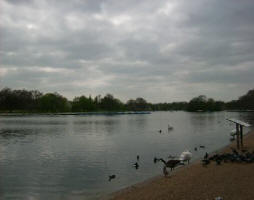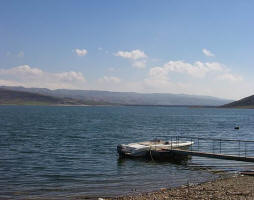 The many challenges of water security in the Mediterranean Region – the need to be PROACTIVE
The many challenges of water security in the Mediterranean Region – the need to be PROACTIVE
Hassan Aboelnga, Middle East Water Forum & Almotaz Abadi, Union for the Mediterranean Secretariat
Achieving water security in the Mediterranean region is an enormous challenge given it is one of the most water-scarce regions in the world, and it struggles with poverty, inequality and underdevelopment. However, there are a range of strategies available that can help the region do more with their available water resources. Here, Hassan Aboelnga and Almotaz Abadi discuss the challenges and the opportunities. As they explain, the solution lies in closer cooperation between regional partners and the implementations of a systematic approach they describe as PROACTIVE.
The COVID-19 pandemic has prompted many questions around the world on water supply and sanitation, and this is especially the case in the Mediterranean region, already one of the most water-scarce regions in the world. On top of this there are the many other challenges associated with water and sustainability. With less than a decade to deliver on the agreed Sustainable Development Goals (by 2030), an unprecedented effort will be required. Member states of the Union for the Mediterranean have agreed to advance solutions to meet water-related, socio-economic challenges, promote climate resilience, while also assisting women and youth towards job creation. How this might be achieved is set out in the Union For Mediterranean Water Agenda and its Policy frame work of action 2030 and the financial strategy.
Shifting the status-quo in the Mediterranean region is urgently needed yet the challenge of bringing about change is enormous. In terms of socio-economic and political conditions, the Mediterranean region is incredibly diverse. This diversity contributes to the conflict and political instability being experienced in the region, and it is not helping it deal with the triple threats of climate change, rising food and energy costs, and economic crisis. These threats are exacerbating poverty, inequality and underdevelopment.
Water flows through all of these issues. Water in the Mediterranean is highly interlinked with economic growth, conflict, migration, employment, and human rights, all of which are shaped by the management and access to water resources.
Water, energy and food security nexus (and much more)
It is increasingly clear that effective and sustainable solutions to the major challenges in the Mediterranean will require a greater understanding and consideration of the linkages and inter-dependencies between sectors such as water, energy and food. Around the world agriculture is the biggest user of water, consuming around 70% of the available resource. Energy is required to produce, transport and distribute food. About 30% of global energy is used by the food sector. But demand for water, food and energy are increasing due to population growth and economic development. The Water Resources Group (WRG) has estimated that by the year 2050, 50% more water, 60% more food and 80% more energy would be required globally. The WRG has also predicted that by 2030, the world may face a 40% global water deficit under a business-as-usual climate scenario. This is expected to have many negative impacts on ecosystems
If the world has a major problem with water, energy and food, then that problem is even worse in the Mediterranean region. In the Mediterranean more than 85% of water is used for agricultural purposes, but the region has also the highest dependency on food imports. Over the years, agricultural productivity has not increased in a meaningful way. Food loss and waste have reached alarming levels with huge implications on water, land, energy, and GHG emissions. The region is a global hotspot for the over exploitation of groundwater, a resource that will be rapidly depleted in the coming decades. In light of this, future agricultural policies will need to have a heavier reliance on other irrigation sources such as the reuse of wastewater, while following more stringent guidelines for reducing waste. Opportunities around demand management of water are well articulated but underutilized.
Interlinkages across sectors (water, food, energy, ecosystem) and the natural resources base (water, land, soils) are understood but not adequately reflected in policies and practice.
In addition to this, the region has enormous problems with managing and governing transboundary water. This is especially the case with many upstream nations developing hydropower to meet their increasing demands for energy. The Mediterranean needs to place regional cooperation for transboundary water management on its priority list.
Financial challenges for water security
The UFM financial strategy for water has outlined the challenges and key opportunities to achieve water security in the Mediterranean region.
Key challenges include an insufficient allocation of public budgetary resources to sustainable water management to address the current and future needs. There are other options available to finance the development of sustainable water management. These include the application of the user/ beneficiary pays principle, and the polluter pays principle, but these approaches are not applied consistently across the region.
There is also not enough attention being paid in many countries to engaging private sector investors or engaging with partners overseas. The main barrier for attracting funding from international financial partners is the low capacity to improve the quality of project proposals. In most countries, any increase in financial resources for water-related projects will require policy reforms and/or significant efforts towards implementation.
The outbreak of COVID-19 has added an additional layer of complexity for the region in terms of addressing water and food security. With the increasing demand for water to help combat the spread and transmission of the virus, along with a higher use of water for agriculture as countries ramp up efforts towards food security, strains on an already scarce resource are emerging. These could lead to higher water tariffs.
At the same time, recent trade restrictions, particularly on cereal exports, are also a significant problem for the Mediterranean and many countries in this region are net importers. The need to rethink water for food security in an increasingly water-scarce region through prioritizing climate adaptation and resilience is crucial.
The keys to adaptation and resilience
The Mediterranean has to deal with resource scarcity, conflict and migration; all of which are closely intertwined. To unlock innovative and regional solutions, the region must pave the way towards adaptation and resilience through close cooperation.
With the enormous uncertainty posed by COVID-19 and the growing disruption from climate change (which includes increasing hydrological variability and its impacts on agricultural productivity), the region needs to urgently consider new strategies for water and food security. These need to be built on empirical evidence. This includes drawing on lessons from the 2008 food crisis to avoid potential hikes in food prices. These new strategies also need to identify measures which unlock the region’s potential to do more with less water.
In this context, we call on leaders of the Mediterranean region to reshape their regional vision for water security and sustainable development. There needs to be greater emphasis on ‘South-South’ cooperation, data-sharing and technology transfers. Alliances among Mediterranean nations need to be strengthened. These need to be centered around reforms for regional water and food resilience, while building regional growth, peace and stability. With shared resources and common challenges, solving the climate crisis in the Mediterranean can only be achieved through close collaboration for the design of solutions which are conflict sensitive, politically aware, and entrenched in the water-energy-food nexus.
Becoming PROACTIVE
With so many challenges to meet, we propose that Mediterranean Leaders focus on being PROACTIVE over the coming decade. PROACTIVE encapsulates the ideas of Priorities, Resilience, Opportunities, Adaptive solutions, Coherence, Technology, Innovation, Vision, and Early recovery. The Mediterranean region needs to move forward in all these areas if it is to ensure water and food security for all.
By aligning water security and climate adaptation with national Priorities, countries can get on track on delivering the Sustainability Development Goals they committed to while scaling up on Resilient and Adaptive solutions.
Member states of the Union for the Mediterranean also need to identify Opportunities to accelerate sustainability transitions, entrenched in improved and innovative regional partnerships.
The Mediterranean’s Vision should also be built on a holistic framework with policy Coherence across sectors at different levels. Horizontal coherence ensures synergy within and among different policy domains while minimizing inconsistencies and conflicting goals. Vertical coherence ensures the same approach but occurs across different tiers of government: international, national and local. This will be crucial when considering trade-offs of resource management and balancing interests of competitive sectors actors.
Finally, while planning for an Early recovery the region’s vision should be rooted in unlocking Technology and Innovation as a central pillar in the coming decade.
More information: hassan.aboelnga@mewf.de
Hassan Aboelnga is the Vice Chair of the Middle East Water Forum*. He sits on the Management Committee of specialist groups at the International Water Association, and is Chair of the Urban Water Security working group and member of the Water Security Task Force at the International Water Resources Association. Hassan is a PhD researcher at University of Kassel and TH Köln in Germany with a particular interest in urban water security issues.
Almotaz Abadi is the Managing Director at the Union for the Mediterranean Secretariat**. He is responsible for Water Policies and Development working closely with the Water and Environment Division at the UfM Secretariat. Mr Abadi was one of main drivers for the water sector reform and also the governance and private sector initiative for the Mediterranean. This included launching the first Mediterranean Water investment forum in Rome in December 2019.
*The Middle East Water Forum is a pioneer platform with a regional perspective on raising public awareness and enhancing management of water challenges in the Middle East by adopting Effectiveness, Efficiency, Integration and Sustainability through the exchange of data, expertise and innovative technologies without the need to cross borders. Its mission is to promote best practices for cooperation and exchange of knowledge among the various parties and stakeholders involved in water issues and actions through an online forum that ensures the impartial and transparent dissemination of information towards sustainable water security in the Middle East and the Arab region.
More information: https://www.mewf.de/
** The Union for the Mediterranean is an intergovernmental institution bringing together 42 countries to promote dialogue and cooperation in the Euro-Mediterranean region
Banner image: A satellite image showing the Mediterranean Sea. The Strait of Gibraltar appears in the bottom left (north-west) quarter of the image; to its left is the Iberian Peninsula in Europe, and to its right, the Maghreb in Africa. The region faces serious and growing issues connected to water security. (Image NASA)

The views expressed in this article belong to the individual authors.
| Creator | n/a |
|---|---|
| Type of document | PressArticle |
| Rights | Public |
| File link |
https://globalwaterforum.org/2021/02/18/the-many-challenges-of-water-security-in-the-mediterranean-region-the-need-to-be-proactive/ |
| Source of information | ufmsecretariat |
| Keyword(s) | Mediterranean, water-scarce, nexus, climate change, COVID19 |
| Subject(s) | ENERGY , POLICY-WATER POLICY AND WATER MANAGEMENT , WATER DEMAND |
| Geographical coverage | Mediterranean region, |
 you are not logged in
you are not logged in





